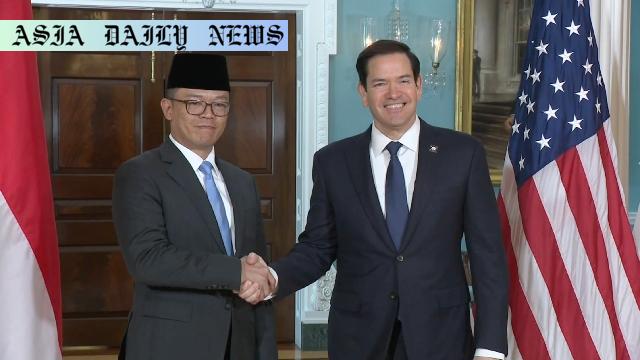Tariffs: Indonesian Foreign Minister Sugiono and US Secretary of State Marco Rubio meet to discuss reciprocal tariffs and trade reforms.

Background: Navigating Reciprocal Tariffs
On Wednesday, Indonesian Foreign Minister Sugiono and US Secretary of State Marco Rubio convened in Washington to discuss a critical trade issue: reciprocal tariffs. The meeting aimed to address economic relations between the two nations amidst ongoing trade challenges. Notably, Indonesia currently faces a 32% tariff imposed by the US; however, this tariff’s implementation has been temporarily paused for a period of 90 days.
US Aims for Trade Fairness
During the discussions, Rubio commended Indonesia for its visible efforts to improve trade fairness. According to the US State Department, Indonesia’s reforms toward creating a balanced and equitable trade relationship were acknowledged positively. The Indonesian government has reportedly worked diligently to eliminate unnecessary regulatory barriers and foster an encouraging climate for foreign investments.
Indonesia’s Economic Strategy
In addition to Minister Sugiono’s engagement, Indonesia’s Coordinating Minister for Economic Affairs has also been active in advancing economic diplomacy in the United States. Reports suggest that Jakarta is steadfast in broadening its trade relationship with the US by proposing increased imports of liquefied natural gas and American agricultural goods. This proactive approach demonstrates Indonesia’s commitment to strengthening ties with its second-largest export market.
US-Indonesia Economic Interdependence
As the US represents Indonesia’s second-biggest trade partner after China, economic interdependency between the two countries continues to grow. In 2022, Indonesia recorded approximately a $17 billion trade surplus with the US, underscoring the significant scope of their economic relationship. By addressing the tariff issue and promoting reformative policies, both nations aim to unlock further opportunities in trade and investment.
The Path Ahead for Trade Reforms
The dialogue in Washington emphasized that resolving the tariff-related issues requires mutual understanding and commitment. Indonesia’s willingness to participate in substantial reforms aligns with its broader economic objectives of sustaining stable foreign investments and diversifying trade partnerships. Meanwhile, the US seeks to refine trade relationships and ensure equitable engagements with its trading partners globally.
By the end of the 90-day deferment, both nations will likely reassess their positions and determine the future of the controversial tariff. The diplomatic efforts displayed thus far reflect the potential for equitable resolutions and enhanced bilateral ties.
Commentary
The Importance of Balanced Trade Between Nations
Indonesia and the US are making important strides to resolve trade tensions, emphasizing diplomacy and collaboration. Reciprocal tariffs are often contentious issues; however, their discussion reflects the commitment of the two nations to find common ground. Delaying the application of the 32% tariff for 90 days offers an opportunity for bridging gaps and developing mutually beneficial trade strategies.
Indonesia’s Reforms and Economic Vision
Indonesia’s ongoing reforms to improve its trade environment mark a decisive step forward. By focusing on deregulation and luring foreign investors, Jakarta is working not only to address its current challenges but also to position itself as a key player in the global trade economy. Moreover, its offer to increase imports of liquefied natural gas and agriculture shows strategic foresight in diversifying trade partnerships and showcasing fairness.
The US Perspective: Collaborating for Fair Trade
For the US, ensuring fair trade through balanced and equitable agreements is a top priority. A transparent, consistent economic relationship with Indonesia would reinforce American trade objectives while acknowledging the importance of partners in Southeast Asia. By supporting Indonesia’s reforms, the US strengthens bilateral ties and bolsters its influence in the region.
Expectations for the Future of Tariffs
Looking forward, it will be critical for both nations to approach the conclusion of the 90-day tariff suspension with open minds. The willingness of both sides to conduct constructive discussions thus far is encouraging. Any lasting solution should prioritize not just economic benefit but also strong socio-economic ties between the US and Indonesia.
While challenges remain, the current engagement sets a positive example for resolving international trade issues through diplomacy and collaboration. It is an opportunity for both nations to redefine their economic relationship and set a new standard for equitable trade partnerships.


